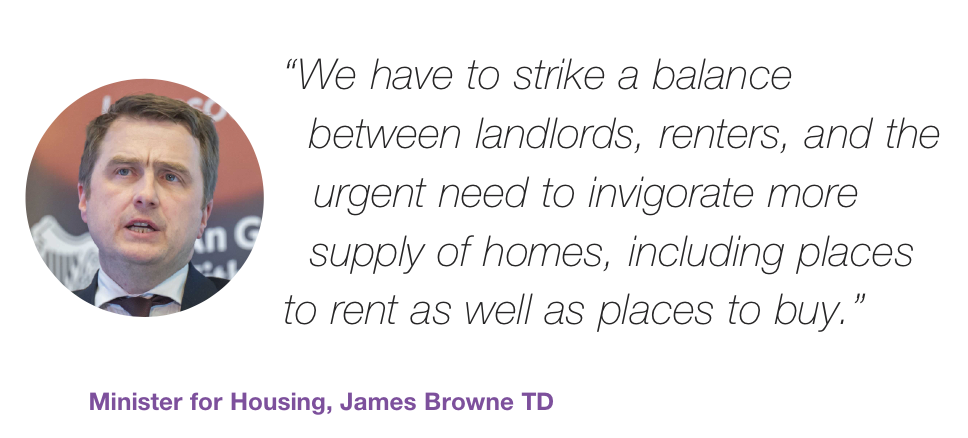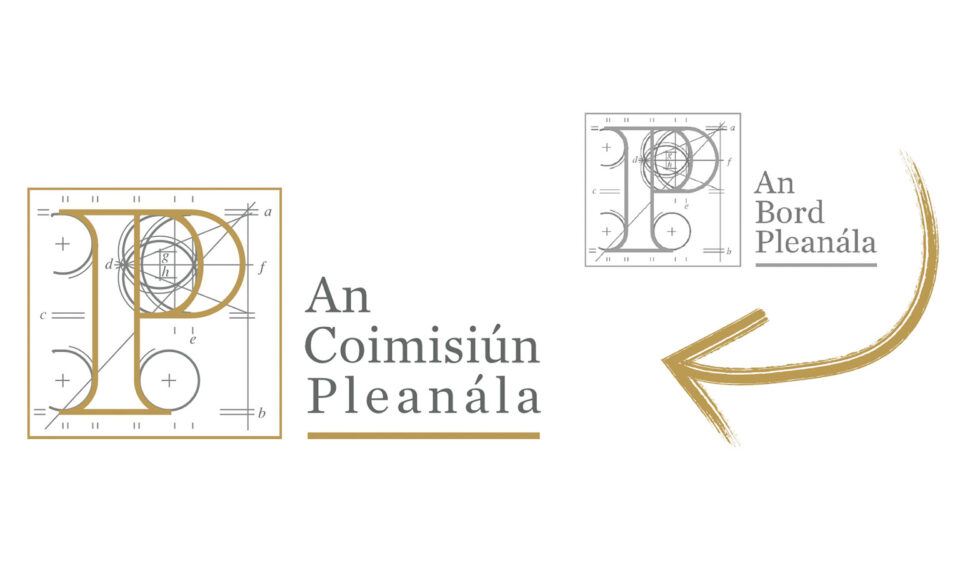
Hooke & MacDonald Research: Building of apartments coming to a standstill
30th June 2025
We need warmer, energy efficient, and connected homes
1st July 2025Multiple rental sector reforms announced

Reforms to the rental sector aimed at increasing private investment to increase supply while enhancing security for tenants were announced in early June 2025 on foot of recommendations made by The Housing Agency in its Review of Rent Pressure Zones Report.
The most significant reform was the extension of the rent pressure zone (RPZ) system which caps annual rent increases at 2 per cent or the consumer price index rate of inflation. Under the Residential Tenancies (Amendment) Bill 2025 approved by the Government on 17 June 2025, the RPZ system extends to the entire state and will apply until 28 February 2026. Previously, approximately 83 per cent of tenancies were located in RPZs and the new measures will see an additional 40,000 tenancies under rent control measures.
While some of the wider reforms are scheduled to commence on 1 March 2026, the nationwide extension of the RPZ system took effect on 20 June 2025. This change was made earlier than planned following concerns that a delay could allow rent increases before the new framework came into force.
To increase rent, landlords must provide tenants with a written notice of rent review and 90 days’ notice of the increase. A copy of the rent review must be given to the Residential Tenancies Board (RTB). Rent can only be increased every 12 months, even if a tenancy ends and another begins within that 12-month period.
The RPZ system was introduced in 2016 as an emergency measure to address “consistent rental inflation”. It was initially designed to last from December 2016 to December 2019 but was subsequently extended in 2019, 2021, and 2024. In 2021, the existing 2 per cent cap was set, a reduction from the initial 4 per cent.
In its recent review, The Housing Agency indicates that the 2021 “tightening of controls” negatively impacted supply, leading to an increase in the supply of homes for sale and a 17 per cent decline in rental registrations. The Review states: “There is some evidence that the current RPZ system is acting as a disincentive to new investment and that the reduction of the rent cap from 4 per cent to 2 per cent saw some smaller landlords leave the market.”
Stakeholders involved in the administration and designation of RPZs from the Department of Housing, The Housing Agency, all 31 local authorities, and the RTB, outlined their support for extending the RPZ system “either as is or with modifications”.
Upon publication of the bank’s quarterly bulletin in mid-June 2025, Robert Kelly, director of economics and statistics at the Central Bank of Ireland, says the reform will increase supply but negatively impact renters.
“The reforms, definitely, are a step towards incentivising [supply] as they do have rent resets within them.”
Further reforms
Rolling six-year tenancies of minimum duration for smaller landlords – those with three tenancies or fewer – will be introduced. At the end of each six-year tenancy, small landlords will have the right to terminate tenancy due to an intention to sell, renovation of the property, it is required for a family member, or it has a change of use.
All landlords who enter a new tenancy arrangement on or after 1 March 2026 will be entitled to reset rent in scenarios where it is below the market rate at the end of each six-year tenancy. This does not apply if a no-fault eviction occurs. Landlords will still be prohibited from setting rent above the market rate under the Residential Tenancies Acts.
From March 2026, large landlords – those with four or more tenancies – will not be able to terminate tenancies where the tenant complies with obligations except for “very limited circumstances”. However, small landlords will be able to terminate a tenancy “where they face hardship” such as separation, homelessness, or bankruptcy, or if an immediate family member requires the dwelling.
Newly built apartments and student-specific accommodation with commencement notices issued on or after 10 June 2025 will not be subject to the 2 per cent cap. Rent increases in these developments will only follow the Consumer Price Index.
Upon announcement of the reforms, Minister for Housing James Browne TD said: “Ultimately, we must improve the situation for renters, and a key piece of the jigsaw is in increasing the supply of rental accommodation. Currently, rent control is linked to a property, rather than a tenancy. The Housing Agency report has highlighted this as a deterrent to investment.”
The Minister indicated that allowing landlords to reset rents to market value for new tenancies will “stimulate investment and keep existing landlords in the market”. To avoid “economic evictions”, where landlords end tenancies in order to raise rents, Minister Browne said “it is intended that resetting rents will not be allowed for no-fault evictions”. He added: “This measure will also facilitate landlords to reduce rents for tenants if they wish, knowing they would be able to reset to the market rent at the start of a new tenancy.”
In other measures announced, all landlords will be able to sell a property with a tenant in-situ “at any time”. Rent increase in developments which are subject to a commencement notice to planning authorities will be capped by the consumer price index “to incentivise new development of apartments”.
“Protecting renters is essential in the moves we make now towards increased supply of housing,” said Minister Browne. “The measures we are introducing strike a fair balance, and one that provides much needed certainty for everyone.”
Rising rent
The RTB Director’s Quarterly Update for Q2 2025, published in May 2025, states that standardised average rent for new tenancies rose year-on-year by 5.5 to €1,680 in Q4 2024, adding that rent for existing tenancies nationally rose annually by 4.6 per cent to €1,440 in Q4 2024. It notes: “This marks a moderation on the rates of rental inflation seen earlier in 2024. However, new tenancy price rises remain persistently high in certain counties.”
The report finds that registered private tenancies rose year-on-year by 4.6 per cent to 240,604 in Q1 2025, but fell by 0.15 per cent from Q4 2024. Landlords associated with registered private tenancies rose by 1.4 per cent to 104,470 in the 12 months to Q1 2025. Approved housing body registered tenancies increased year-on-year by 11 per cent to 51,230 in WQ1 2025.
Registered student-specific accommodation tenancies rose annually by 8.4 per cent to 36,521 in 2024 as registered cost rental tenancies grew by 185 per cent to 2,414. In Q1 2025, the RTB received 4,693 notices of termination, down by 2.4 per cent from Q1 2025. The RTB also said it published 36 sanctions with a total value of €102,490 against landlords on the day of the report’s release.
Upon publication of the report, Labour Party housing spokesperson Conor Sheehan TD said: “This RTB report confirms what every renter in Ireland already knows – nothing has changed. Fine Gael and Fianna Fáil continue to treat renting as a temporary phase of life, ignoring the fact that for a huge number of people, renting is a long-term reality. It’s abundantly clear to me that Fine Gael and Fianna Fáil are totally out of touch with the reality of the housing crisis. This is a huge generational issue, one they simply don’t understand. With rents now exceeding €2,000 in many areas, an entire generation feels locked out of home ownership, trapped by spiralling rents and rising living costs.”







